| Is oil a reason to go to war?
Perhaps it is--if it is used to keep cold children from freezing to
death. Russia is making a pact with Iraq to lock down oil
and gas extraction contracts. Russia is laying "claim" to Iraq's natural resources so when the country
is divided by its new leadership, Russia will have first exaction.
How does Blood For Oil mix with the waters of Vigilance?
How can Freedom rise above the thirst to capture Iraq's rich
resources? And, what does Harry Potter have to do with it all?
You'll enjoy this one. |
 VigilanceVoice VigilanceVoice
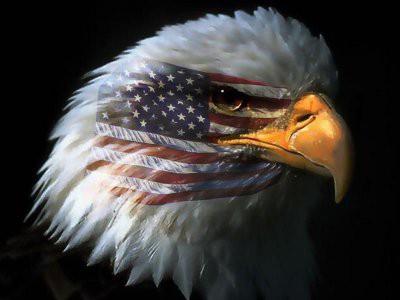
www.VigilanceVoice.com
Monday--November 18, 2002—Ground
Zero Plus 432
___________________________________________________________
Russia Adds "Oily" Touch
To Launching War On Iraq
___________________________________________________________
by
Cliff McKenzie
Editor, New York City Combat Correspondent News
GROUND ZERO, New York
City, Nov. 18 -- The
war in Iraq may be fought on idealistic principles as far as the public is
concerned, but for pragmatists, it's all about oil.
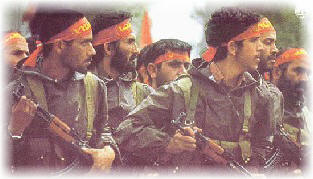 |
|
Iraqi Soldiers |
As winter approaches, the awareness of oil
becomes heightened. It's one thing to be poor in America, but
quite another to be "cold" and poor.
Oil is the solution to both. Oil
prices drive the world's economy. The higher the price of oil per
barrel, the greater troubles rock the global economy. Oil
fuels the engines of productivity. Without it, modern
civilization grinds to a stop.
That's why Russia is such a big
player in the War On Iraq. Russia is the single largest
consumer of crude oil from Iraq. Currently, Russia controls
almost one-third of the developed oil deposits in Iraq, around 650 billion
barrels according to Pravda, Russia's leading newspaper.
Pravda also reports that Russia controls one-half of the developed
gas reserves, 1800 trillion cubic feet. Iraq is the second largest
extractor of oil globally.
 |
|
Iraqi oil rig |
What this all means is there
are a lot of Russians in Iraq.
The Russian "oil barons"
keep a close eye on the manufacture and delivery of oil and gas to the
Motherland. It also means that war on Iraq must tip-toe around
Russian workers and leaders who toil the land in search of oil, or
maintain its free flow.
 |
Russia also threw a wrench into the
impending war on Iraq. Russia is on the verge of signing a 10-year $40
billion economic cooperation pact with Iraq that includes 67 contracts in
the fields of oil and gas extraction, transportation and communications.
Some say that Russia is "staking out
its territory" so when the war with Iraq ends, it will lay major claim to
the resources that will be divided. In World War II, Russia
declared war against Japan in the 11th hour, and strolled into the peace
talks to lay claim share to the spoils.
Legally, any new regime will have to
honor agreements with the Iraqi state granted to nations during the
Hussein rulership.
This doesn't mean Russia is not an
ally against terrorism. It has confirmed its anti-terrorism
alliance with the United States, but as with any nation, its economic
agreements remain selfish. It needs Iraq's resources
regardless who runs the country. However, its citizens in
the nation pose a clear and present concern if and when war breaks out.
I found it interesting that Pravda is
currently running a poll. When you dial up the on-line version of
the newspaper, the query isn't "if America is going to war with
Iraq?," it is "When do you think America will launch its war?"
The conditions of whether war will happen or not have been erased.
The poll question appears as an endorsement
of war rather than a challenge to it. Citizens who see the
question read it as an affirmation, at least I did, that Moscow favors the
removal of Saddam Hussein. Two reasons play to the affirmation
of the war by Russia. One, Hussein owes Russia billions of dollars
on oil concessions Iraq hasn't paid, and probably won't. And
secondly, the embargo on Iraqi exports hurts the flow of commerce between
Baghdad and Moscow.
We forget all wars are fundamentally
fought over resources. In Vietnam, Cam Rahn Bay represented
the world's most natural seaport. It was the primary route to
shipping for foodstuffs in Southeast Asia. The Mekong Delta
and South Vietnam can provide enough food to virtually feed billions of
people.
Palestine and Israel are two other
gleaming examples. The war there, ideologically based, is still
about dirt--about who owns and controls the land.
Iraq's and Iran's long war was
fundamentally over the right to the water that flowed between the two
nations.
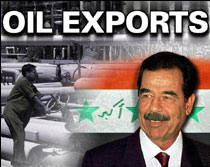 |
When nations are conquered, the
historic rule is the conquerors divide the country's spoils between them.
In Iraq's case, the civilized method of doing that is honoring legally
binding contracts between states. The Russia-Baghdad connection over
exporting oil and gas is one of those. The United States
is also a major player. Twelve percent of America's oil and gas
demands come from the Middle East. Creating a Marshall Plan to
democratize Iraq would include, of course, favorable deals for the U.S. to
export the precious "black gold" or oil.
As the drums of war beat louder, so
do the sounds of oil drippings.
On the streets of my home-ground, the
East Village of New York City, the sidewalks occasionally blaze a chalked
message: "No Blood For Oil!"
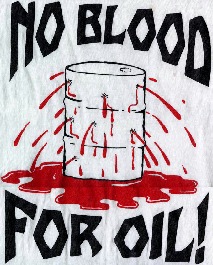 |
It reminds me of the leaning post,
where one strolls along and finds a post leaning in one direction and
rests against it, oblivious to the another pole just down the way leaning
the opposite direction. One leans toward idealism, the other toward
pragmatism.
I think Vigilance is the Balance
Point between the two.
Oil can be a reason to fight a war if
the children of the world are freezing.
Water cam be a reason for fighting a
war if the children are dying of thirst.
Food can be a reason if the children
are starving.
And defense can be a reason if the
children are being attacked, or threatened.
Vigilant Thinking requires one to set
aside his or her own political views and look through the eyes of a
child. Children see two things--idealism and pragmatics.
They want the cow to jump over the moon, and, they want to eat, and be
warm, and not be afraid of the boogeyman.
 |
Children's imagination soar when
their bellies are full, when they are warm and happy.
A starving, cold, hungry child has no
time for imagination, no time for idealism. Such a child
becomes an animal in search of survival.
In Vietnam I remember the children.
When we would set up camp the children would mass around us, eyes big,
clutching hold of the razor sharp concertino barbed wire and look at us
with pitiable eyes. Some had sores on their faces, others a forlorn
look that comes from being forced out of innocence into maturity without
any time for childhood. They would watch us
open our C-Rations, and hold out their hands, begging for something.
 |
One of their biggest treasures was
soap, not candy. If you threw over a bar of soap the kids
would form a Rugby pile, fighting for it. The victor would run
away with it clutched to his or her gut, like an end dashing for a
touchdown.
Soap, I thought. Soap!
The urge to be clean was sometimes more powerful than the taste of
chocolate or the smacking of gum. Cleanliness was indeed the closest
portal to godliness to the children. A bar of soap was gold.
It was wealth.
Oil also means wealth to the
children. Its purchasing power belongs to the children..
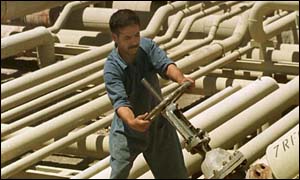
|
|
Oil Pipes in Iraq |
Current,
leadership in Iraq, as in most of the Middle East, stops the profitable
flow of wealth at the top. Very little trickles down. Nations
ruled by monarchial or despotic leaders tend to take the nation's wealth
for themselves, forgetting that what they take truly belongs to the
children's prosperity and that they are only guardians of it..
Rulers more interested in themselves stop the flow downward to the people.
Instead of investing it in the children's future, it goes to lavish
palaces and Swiss Bank Accounts, and finds its tributaries to the family
members, with an occasional drip here and there to the "people" who live
in a feudal system divided by "rich" versus "poor," the "noble" vs.
"the common."
Russia's claim to oil rights is
its security blanket to keep its children warm in the cold Siberian
winters, and to fire its engines of production so it can right the ship of
democracy that has been sailing with holes in its hulls after the fall of
communism.
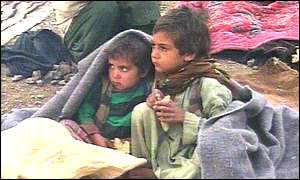 |
|
Cold children |
Probably no other nation stands
to gain more from the fall of Iraq's despotic leadership than Russia,
since it has the major claim over the nation's resources.
It's alliance with America and support of anti-terrorism has brought it
yet closer to the West. The recent attack on Russian citizens
by Chechen Terrorists puts it in a league with America's victims of Nine
Eleven.
It too has Sentinels of Vigilance
over its Ground Zero.
The issue of No Blood For Oil doesn't
really oil the idealism of fighting the war in Iraq. The
people in that nation suffer because of its leadership. All
despots deprive their people of fundamental rights. Without their
selfishness they would not be despots.
This where idealism and pragmatism meet.
Both crash headlong on the issue of war.
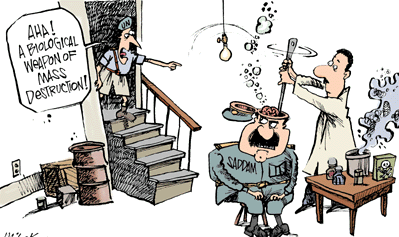 |
They force one to reason and justify what is
happening in Iraq, and why the U.S. is planning a war under the thin veil
of "weapons inspection violations."
The Middle East rules over its people with
deprivation. When democracy is denied the citizens of any
country, the children suffer. Children have a right to keep
their imaginations alive by believing they can become "anyone they want to
be." In American mythology, the belief any child can
grow to become the President of the United States is a driving force that
crashes down class barriers. The rise of Bill Clinton to the
top of the world's leadership is one example, Harry Truman another.
The same is true in business. Poor children
can become rich citizens in a democratic, capitalistic society that
rewards one for hard work and ingenuity. A person with
limited if not poverty resources can rise to the top if he or she is
willing to work and employ the principles of entrepreneurialship.
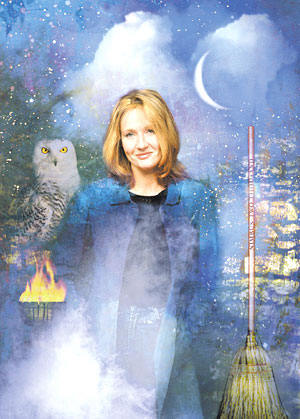
|
I was studying the history
of Harry Potter's author, J.K. Rowling. She was
a shy young girl who kept her imagination locked up. She
never told anyone about her writings, or showed them to her
friends for fear they might not like what she wrote.
She lived in near poverty with her daughter, writing and teaching
French. She wrote her stories piecemeal over a long period
of time and it took a year for her final manuscript to be published.
It was her belief that
she could achieve that drove her to achieve. The "free
society" of England, her home, offered her the childish
belief that "cows could jump over the moon," as well
as the pragmatic reality that she would have to work hard to
make her writings "acceptable" to the reading public.
If she hadn't had the imagination
of a child, with all its Courage, Conviction and Right Actions
necessary to drive her beyond her Fears, Intimidations and Complacencies,
the world might not have seen Harry Potter. But they did.
Freedom allowed Harry to become the world's most creative "wizard."
One can take his adventures as a "search for Freedom,"
constantly facing the "Terrorists of Freedom" who
want to quash his powers of imagination.
The issue of oil
or weapons in Iraq fall behind the real issue--the Rights of
Freedom for the children, and their children's children's children.
I wish the
peace activists would chalk on sidewalks of the East Village
this message: "Free The Children of Iraq To Be Harry
Potters."
They can be freed.
They will be freed.
If we are Vigilant.

Nov. 17--Eagle
Dancers of Vigilance
©2001
- 2004, VigilanceVoice.com, All rights reserved - a
((HYYPE))
design
|
|














